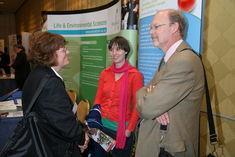
Food production in the 21st century, genetics and the EU-funded project Isafruit all came under the spotlight during the Spot the Difference session at Re:fresh 2008.
There is a considerable range of production systems available to conventional and organic growers, said Dr Rosemary Collier of Warwick HRI. “However, with the number of logos associated with production systems, it’s no wonder consumers are often confused,” she said.
Collier argued that food production is a science challenge, but organic and conventional production systems can learn from each other and be "mutually beneficial".
Physical techniques such as the use of mechanical weeders that have been developed for organic crops can be useful when growing conventional crops. Polyculture, which includes intercropping, has also been evaluated as a way to control pests and diseases.
As the industry faces key challenges including rising input costs, environmental protection and food shortages, Collier said the pressure is now on to deliver food quantity and sufficient quality with reduced inputs.
During his presentation, Professor David Pink discussed how genetics could help to deliver sustainability. He argued that the focus needs to be shifted to the resistance of the crop, and not the plant.
By using natural genetic variation, breeders can breed crops that can use or acquire resources, including nutrients and water, more efficiently thereby reducing these inputs into agricultural systems and providing economic and environmental benefits.
Furthermore, shelf life can be improved by genetics and breeding. And by reducing food wastage, food production will become more sustainable, Dr Pink said.
When asked whether genetically modified crops were inevitable, Dr Pink answered that GM is already used in food production. “Some of this is driven by sustainability and some areas won’t be able to breed crops without GM support. There is the moral dilemma: are we going to let other countries produce GM crops but not Britain?” he said.
Dr Esther Bravin outlined the objectives of the Isafruit project during her presentation, ‘How to obtain a more sustainable pre-harvest fruit chain’.
This project is designed to increase fruit consumption in Europe, and looks at the whole supply chain from fruit quality genetics to post-harvest and consumer demand.
To date, Isafruit has mainly focused on apples, although some research is also being carried out on peaches and pears.
“The objectives of Isafruit involve increasing the quality of fruit and fruit products, improving taste and appearance, increasing fruit safety and contributing to the possibility of lower prices and production costs," said Bravin.
Raising the performance of the crop to offset labour costs, increasing the amount of Class I fruits grown and choosing the right fruit varieties for your orchard are key to successful production.
Farmers will be able to compare the costs of organic and conventional production under Isafruit’s Profitfruit model. This tool will also be available to those seeking to switch from conventional to organic production. “In Switzerland, producer prices for organics can be 50-100 per cent higher,” said Bravin. “That’s a big difference, but big risks can be involved.”



